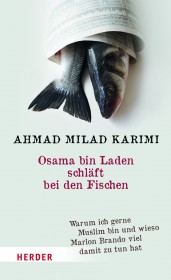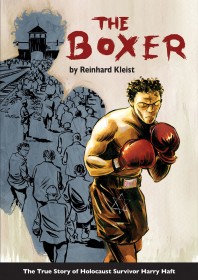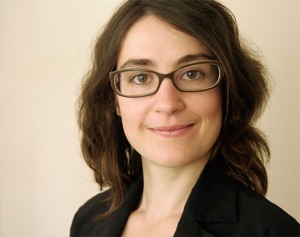“New German Stories,” an event series launched in January 2014 as part of the Academy program, continues this evening, 10 March 2015, when Ahmad Milad Karimi, Professor of Islamic Philosophy and Mysticism at the University of Münster, presents his new book Osama bin Laden is sleeping with fishes (Osama bin Laden schläft bei den Fischen) at the Academy of the Jewish Museum Berlin. We put three questions to our guest, prior to the event.

Ahmad Milad Karimi: Osama bin Laden is sleeping with fishes (Bookcover) © Herder Publishers
Julia Jürgens: Dear Mr. Karimi, in your autobiography you bring together Western popular culture and the history of Islamic intellectualism, the translation of the Koran and your PhD thesis on Hegel, Persian mysticism and a penchant for mafia films. If I may make a question of your book’s subtitle: What does Marlon Brando have to do with the pleasure you take in being Muslim?
Ahmad Milad Karimi: That is a secret of the book, a secret concealed first and foremost by the fact that there is always more to people than the pigeonhole we like to keep them in.
Six years ago you published your new translation of the Koran. What motivated you to take up such a challenge and add a new translation to those already in existence?
The Koran is more than simply a book—it is → continue reading

Cover of the Graphic novel © Reinhard Kleist, The Boxer, Selfmadehero 2014
Several of us at the Jewish Museum Berlin have observed that, over the last few years, the market for young adult literature has begun to demonstrate a growing interest in the subject of Nazism and the Holocaust. In the coming weeks, we will be introducing contemporary and classic works on this topic that we have read and discussed together.
What happened to the people who survived the concentration camps – what was life like afterwards? For their families, their children, the survivors themselves?
Alan Scott Haft’s father Hertzko Haft was a vicious and violent man, the polar opposite of what we would consider today to be a “good father.” Many years passed before Alan Scott Haft understood – and he didn’t really want to know – why his father was that way.
At some point he learned a little more: → continue reading
Tomorrow evening, 9 September 2014, the cultural anthropologist Alina Gromova will present her book “Generation ‘kosher light’” (transcript Verlag 2013) in the Academy of the Jewish Museum Berlin. As in the case of the many other authors whose “New German Stories” we recently discussed, we put three questions to Ms. Gromova prior to her reading:

Alina Gromova © Judith Metze
Alina, for your study of an international group of young Jews in Berlin you took the city itself as your springboard. Exploring the locations where your subjects live, hang out, mingle and party enabled you to chart their diverse notions of identity, tradition and religion. Why did you opt for such an explicitly spatial focus?
Identity and tradition are terms often difficult to grasp, because they are interwoven with symbols, values, wishful thinking or memories. A space, however, has not only a symbolic but also a physical dimension and is therefore more palpable. Personally, I don’t see a space as a 3-D void waiting to be filled by people or things. On the contrary, people and things are what create a space in the first place. And urban space is especially fascinating, I find, because a broad cultural and religious spectrum often occupies one and the same spot, however tiny; and different elements simultaneously give rise there to their own spaces, so the result is a palimpsest of spaces that then interconnect.
→ continue reading


